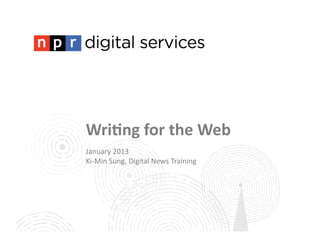
Writing for the web 2013
- 1. Wri$ng for the Web January 2013 Ki-‐Min Sung, Digital News Training
- 2. Web wri$ng Webified radio stories Web-‐na@ve storytelling 2
- 3. Online News Cycle 3
- 4. Webify vs. Web-‐na$ve Who is my audience? What is most relevant? What is the best use of my @me? 4
- 5. What doesn’t work… 5
- 6. What doesn’t work… 6
- 7. Visual Medium 7
- 8. What works… 8
- 9. What works… 9
- 10. WEBIFYING RADIO SCRIPTS 10
- 12. Webified Story 12
- 13. Compare ledes Radio: Most people over 50 think they're likely to be healthier and more ac@ve in re@rement than their parents were. That's what people said in a poll conducted by NPR, the Robert Wood Johnson Founda@on and the Harvard School of Public Health. But people may be wrong. Some experts worry that the genera@on now approaching re@rement may actually be less healthy in old age and that could have serious financial consequences for the na@on as a whole. NPR's Julie Rovner reports. JULIE ROVNER: If you want to see what it means to live a long and ac@ve life, look no further than the rec room at the Greenspring Village Re@rement Community in Springfield, Virginia. (SOUNDBITE OF VIDEO GAME) ROVNER: This is the Wii bowling compe@@on for the Northern Virginia Senior Olympics. Up now, the 80 to 99 age group. Given these compe@tors' age, organizers are making a few accommoda@ons.
- 14. Compare ledes Web: Most baby boomers say they're planning on an ac@ve and healthy re@rement, according to a new poll conducted by NPR, the Robert Wood Johnson Founda@on and the Harvard School of Public Health. And, in a switch from earlier years, more than two-‐ thirds recognize the threat of long-‐term care expenses to their financial futures. But some experts worry that when it comes to their health, boomers are s@ll woefully unprepared — or worse, in denial. "The mismatch between how people think the next 10 to 15 years is going to go and what current re@rees experience is something that's very consistent," says Jeff Goldsmith, a health care futurist and author of The Long Baby Boom: An Op2mis2c Vision for a Graying Genera2on, a book about aging baby boomers. "There is no ques@on that one dis@nguishing feature of our genera@on is this extraordinary, almost gene@c op@mism. And the poll results look to me like a lot of that op@mism was drawn from a deep well of self-‐delusion."
- 16. Webifying 16
- 17. 17
- 18. Five Differences: Web vs. Radio Wri$ng 1. Get to the point, tell me why it’s important 2. Grammar and spelling are important 3. You can say it bejer than your source, summarize 4. Details – this proves you know what you’re talking about 5. Headlines majer A LOT 18
- 19. Looking Ahead Not all radio stories are meant to be web stories Try wri@ng web text first – it can even make your broadcast story bejer If you’re not breaking news, what are you adding that will dis@nguish your story Go to where you audience is, don’t expect them to come to you 19
- 20. WEB-‐NATIVE STORYTELLING 7 ways to signal webbiness 20
- 21. Webbiness 21
- 22. 1. Create web-‐only stories 22
- 23. 2. Link out to relevant material 23
- 24. 3. Embed content 24
- 25. 4. Update stories 25
- 26. 4. Cura$on 26
- 27. 5. Make it easy (Scannable) 27
- 28. 6. Let the format fit the story 28
- 29. 7. Listen & respond to your audience 29
- 30. CASE STUDY: KPLU 30
- 31. Web Checklist (must hit at least 2) 1. Is it @mely? (Are we ahead of others?) 2. Are you adding something NEW to a known story? 3. Does it have a unique angle or perspec@ve? 4. Does it ask users to take ac@on or express an opinion? 5. Is it shareable? (Would YOU share it?) 6. Does it celebrate an idea, person or place? 31
- 33. Broadcast first Web first Web days later Broadcast week later
- 34. Web to Air 34
- 35. What to ask… 1. What’s next? 2. Who are the key players? 3. How did we get to this point? 4. Why does this majer? 35
- 36. Ques$ons 36
- 37. Assignment 1. Rewrite a radio story for the web audience 2. Write a web-‐na@ve story Due: COB, Thursday, January 31 dseditorial@npr.org 37
